| Srl | Item |
| 1 |
ID:
137235
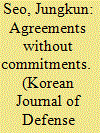

|
|
|
|
|
| Summary/Abstract |
Twenty years after the deal struck between the United States and North Korea over the nuclear crisis, the security environment on the Korean Peninsula remains unstable. When it comes to the U.S.-North Korea Agreed Framework from 1994 through 2002, previous research has paid scant attention to how the U.S. Congress responded to President Clinton’s accord with the Pyongyang regime. This article
provides a rare empirical assessment of what led America’s lawmakers to uphold or overturn the executive agreements with North Korea. The bottom-line finding is that politics hardly stops at the water’s edge, with “politics-as-usual” forces such as partisan conflicts ultimately having derailed Congressional commitments to the U.S.-DPRK accords. The results shed light on how and why domestic politics often redirects the course of international agreements, particularly in the era of
polarized politics.
|
|
|
|
|
|
|
|
|
|
|
|
|
|
|
|
| 2 |
ID:
129636
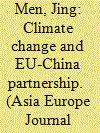

|
|
|
|
|
| Publication |
2014.
|
| Summary/Abstract |
Both the EU and China are important participants in the United Nations Framework Convention on Climate Change and the Kyoto Protocol. The EU's reliance on legally binding rules and institutions demonstrates its strong belief on institutionalism. While interstate cooperation is certainly necessary, implementation of any international agreement and most of the work needs to be done within a state. Henceforth, an uneasy balance between national interests and international responsibility has to be maintained. In the case of EU-China partnership, the carbon aviation tax issue serves as a good example to examine the realist-institutionalist struggle. Although it is still too early to tell if the EU and China would overcome their major disagreements in the field of climate change, there is reason to believe that an international agreement may be reached by 2015.
|
|
|
|
|
|
|
|
|
|
|
|
|
|
|
|
| 3 |
ID:
131512


|
|
|
|
|
| Publication |
2014.
|
| Summary/Abstract |
This research note highlights an important element missing from rational design theories of international agreements: "institutional context"-the presence or absence of existing and prior agreements between prospective partners in "new" cooperation. If, as rational design theorists argue, agreement design is deliberate, strategic, and directed toward enhancing contracting parties' ability to credibly commit to future cooperation, then prior design "successes" should influence the terms of additional cooperation. We test for this omitted variable problem in three agreement design outcomes: ex ante limitations on agreement duration, exit clauses, and dispute-settlement provisions. Through an augmentation and reanalysis of data from a key study in the rational design literature-Barbara Koremenos's "Contracting Around International Uncertainty"-we show institutional context is positively correlated with inclusion of ex ante time limitations in negotiated agreements and negatively correlated with the inclusion of exit clauses and third-party dispute-settlement provisions. Institutional context also mediates and conditions the effects of the explanatory variable at the heart of existing rational design theories-uncertainty about the future distribution of gains from cooperation. Our findings show that the collective appeal of particular design features varies not only with the nature of underlying strategic problems, but also with degrees of shared institutional context.
|
|
|
|
|
|
|
|
|
|
|
|
|
|
|
|
| 4 |
ID:
087579


|
|
|
|
|
| Publication |
2009.
|
| Summary/Abstract |
Democratic and autocratic states routinely violate their international agreements protecting human rights. Scholars typically link ratification and compliance behavior theoretically but test their models separately; however, if the behaviors are jointly determined then we should treat them that way empirically. We consider how domestic judiciaries influence the joint choice to ratify and comply with international human rights regimes. Using data on the ratification status of states under the Convention Against Torture (CAT), states' torture practices, and a series of measures of judicial effectiveness, we examine whether legal institutions are likely to constrain state behavior and by implication raise the costs of ratification.
|
|
|
|
|
|
|
|
|
|
|
|
|
|
|
|
| 5 |
ID:
134085
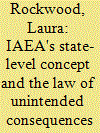

|
|
|
|
|
| Publication |
2014.
|
| Summary/Abstract |
In September 2013, the International Atomic Energy Agency (IAEA) Board of Governors reviewed a report by Director-General Yukiya Amano on efforts to further strengthen the effectiveness of safeguards and increase their efficiency.[1] The report described an approach to the implementation of safeguards that had come to be known as the "state-level concept."
|
|
|
|
|
|
|
|
|
|
|
|
|
|
|
|
| 6 |
ID:
042856
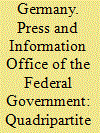

|
|
|
|
|
| Publication |
Germany, Federal Govt. Press, 1971.
|
| Description |
119p.Pbk
|
|
|
|
|
|
|
|
|
|
|
|
Copies: C:1/I:0,R:0,Q:0
Circulation
| Accession# | Call# | Current Location | Status | Policy | Location |
| 009804 | 940.55743155/GER 009804 | Main | On Shelf | General | |
|
|
|
|
| 7 |
ID:
187410
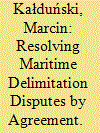

|
|
|
|
|
| Summary/Abstract |
The extension of coastal states’ jurisdiction over seas in the twentieth century significantly increased the maritime area of overlapping entitlements. The Baltic Sea is a textbook example of such competing claims. In principle, the two main avenues for a coastal state to resolve its dispute are to either conclude a delimitation agreement or lodge the case with an international court or tribunal. This article analyzes the Delimitation Agreement between Denmark and Poland concerning the Baltic Sea south of the island of Bornholm. The states were divided as to how to apportion the maritime zone of 3,500 km2, where the economic zones of Denmark and Poland had not been delimited for several dozen years. The agreed single maritime boundary split the disputed area into unequal parts. The settlement of the maritime dispute coincided temporally with Poland and Denmark’s plans to build a natural gas pipeline at the bottom of the Baltic Sea, which probably prompted the two states to put an end to their maritime boundary dispute. The law of the sea provides that the delimitation of maritime zones between states with opposite or adjacent coasts is effected by agreement on the basis of international law in order to achieve an equitable solution. The purpose of this article is to show that (energy) security issues may prompt a resolution of a maritime boundary dispute, and to analyze the Polish–Danish Agreement in the light of the principles governing the maritime delimitation.
|
|
|
|
|
|
|
|
|
|
|
|
|
|
|
|
| 8 |
ID:
137308
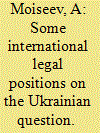

|
|
|
|
|
| Summary/Abstract |
MARCH 18, 2014 saw the signing of an international agreement between the Russian Federation and the Republic of Crimea on admission of the Republic of Crimea to the RF and on creation of new subjects within the Russian Federation. Under the agreement, applicable from the date of signature and in force since its ratification on March 21, 2014, Crimea is considered admitted to the Russian Federation, within which new subjects, the Republic of Crimea and the federal city of Sevastopol, are created. Persons residing as of that date on the territory of the new subjects of the Federation are recognized as Russian citizens but are entitled within a month to declare their wish to retain the citizenship they have. The legislative acts of the Russian Federation are already in operation in Crimea. Crimea's land border with Ukraine is declared a border of the Russian Federation; and the maritime areas in the Black and Azov seas are subject to delimitation based on the principles of international law.
|
|
|
|
|
|
|
|
|
|
|
|
|
|
|
|